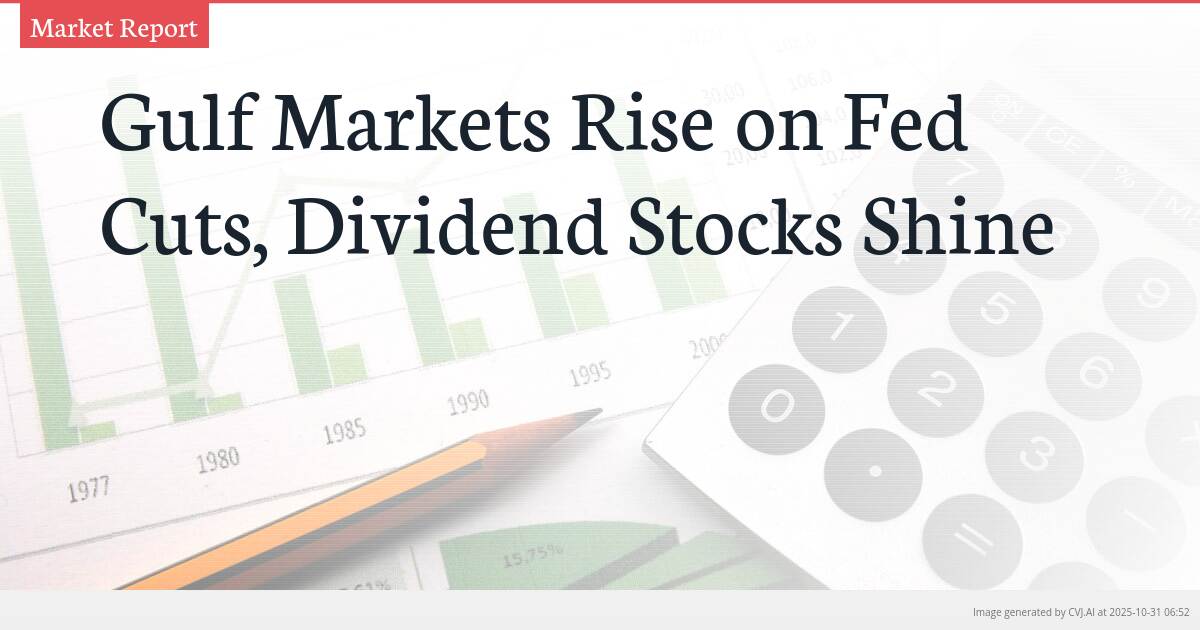This summary text is fully AI-generated and may therefore contain errors or be incomplete.
Introduction
Middle Eastern stock markets are showing positive momentum, driven by strong corporate earnings and U.S. Federal Reserve rate cuts. While most Gulf markets closed higher, Saudi Arabia’s index experienced a slight decline in this dynamic environment, creating opportunities for investors seeking reliable income streams through dividend stocks that balance growth potential with stability.
Key Points
- Most Gulf markets closed higher due to strong corporate earnings and Fed rate cuts
- Saudi Arabia's stock index bucked the regional trend with a slight decline
- Dividend stocks provide reliable income and stability amid market fluctuations
Gulf Markets Rally on Dual Catalysts
The Middle Eastern stock markets have recently demonstrated a positive trend, with most Gulf markets closing higher as investors respond to two powerful drivers: favorable corporate earnings and the impact of U.S. Federal Reserve rate cuts. This combination has created a supportive environment for regional equities, with companies across various sectors reporting stronger-than-expected financial results that have boosted investor confidence. The improved earnings picture reflects both operational efficiency and growing regional economic activity, providing fundamental support for the market advance.
The Federal Reserve’s monetary policy decisions have played a crucial role in the Gulf markets’ performance, with rate cuts reducing borrowing costs for corporations and improving liquidity conditions. This monetary easing has made equities more attractive relative to fixed-income alternatives, prompting capital flows into regional stock markets. The synchronization between corporate earnings strength and accommodative monetary policy has created a virtuous cycle, driving the positive momentum observed across most Gulf exchanges during recent trading sessions.
Saudi Arabia's Divergent Performance
While the broader Middle Eastern market trend has been positive, Saudi Arabia’s index has experienced a slight decline, bucking the regional pattern. This divergence highlights the nuanced nature of Gulf market dynamics, where country-specific factors can override broader regional trends. The Saudi market’s performance reflects unique domestic considerations that have temporarily outweighed the positive influences of strong corporate earnings and Federal Reserve policy.
The slight decline in Saudi Arabia’s index underscores the importance of understanding local market drivers even within a generally positive regional context. Investors monitoring the Middle Eastern markets must recognize that while macroeconomic factors like Federal Reserve policy affect the entire region, individual country performance can vary based on local economic conditions, sector composition, and investor sentiment. This complexity requires a nuanced approach to regional investment strategies.
Dividend Stocks as Stability Anchors
In this dynamic market environment, dividend stocks have emerged as particularly attractive options for investors seeking to balance growth with stability. These equities offer reliable income streams that can provide cushioning during periods of market fluctuation, making them valuable components of a diversified investment portfolio. The current market conditions, characterized by both opportunity and uncertainty, highlight the strategic importance of dividend-paying companies.
The appeal of dividend stocks in the Middle Eastern context is enhanced by their ability to deliver consistent returns regardless of short-term market movements. As corporate earnings remain favorable across many Gulf companies, dividend payouts are supported by strong underlying financial performance. This creates a compelling proposition for income-focused investors who seek exposure to the region’s growth potential while maintaining a defensive posture against potential volatility.
For investors navigating the Middle Eastern markets, dividend stocks represent a strategic middle ground—participating in the region’s economic growth while providing downside protection through regular income distributions. This approach is particularly relevant given the mixed signals from different Gulf markets, with most showing strength while Saudi Arabia experiences temporary weakness. The reliability of dividend income becomes especially valuable in such a bifurcated market environment.
📎 Read the original article on yahoo.com

